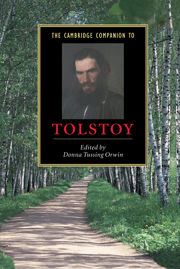1 - War and Peace
from Part 1 - The three novels
Published online by Cambridge University Press: 28 May 2006
Summary
It may seem strange to say so, but only now are readers beginning to appreciate just how great a book War and Peace really is. Not that it took long for this work to achieve its reputation as the greatest novel ever written, but that reputation was based largely on just one of its sources of appeal, its incomparable realism. Tolstoy was able to describe to perfection the smallest details and the largest overall feeling of any sphere of life, from the confines of the nursery to the vastness of the battlefield and from the seriousness of a council of war to the unrestrained joy of a wolf hunt or a dance. And how, readers enthused, he could understand the tiniest movements of the conscious mind or the finest nuances of the soul!
And of the body, too, for no one, it was noticed, had ever quite so well described the ways in which the mind affects the body or the body the mind. Time and again Tolstoy’s characters take an action not because they have decided to but because, by habit or happenstance, their bodies have “for some reason” assumed a posture that suggests it, as if the body has a mind of its own, as it does. Or a smile may appear on a character’s face, “as if forgotten there,” not because the character is thinking of anything happy, but because of an earlier thought he no longer remembers or a pleasant sound the character is not aware of hearing. No contingency of flesh or spirit in their ceaseless interaction escaped Tolstoy. This is realism as no one else has ever practiced it. But at the beginning of the twenty-first century, realism is no longer the supreme virtue it once was; and yet Tolstoy’s reputation has, if anything, grown in recent years. Something else has been discovered in Tolstoy’s masterpiece
- Type
- Chapter
- Information
- The Cambridge Companion to Tolstoy , pp. 63 - 79Publisher: Cambridge University PressPrint publication year: 2002
- 1
- Cited by



